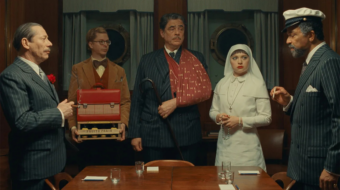The newly formed James Agee Cinema Circle has announced this year’s nominations for the Progie Awards honoring the best in progressive cinema. The group is named after the noted playwright, author and longtime writer for The Nation, James Agee, and is charged with advancing the awareness of progressive cinema. Members include such names as Ed Rampell (Progressive Hollywood), Prairie Miller (WBAI radio), Gerald Horne (Houston University), Victor Navasky (The Nation), Paul Buhle (Brown University) and many other noted writers.
Rampell premiered the Progies in an article that first appeared last year in The Progressive magazine. This year’s nominees, submitted by the members of the James Agee Cinema Circle, were announced by Rampell on the Thom Hartmann radio show.
The 20 categories are named after prominent names in the film world. Awards include Best Progressive Film, named after Dalton Trumbo, noted victim of the Hollywood blacklist; Best Progressive Activist named after Marlon Brando; Sergei award (after the great Soviet director Eisenstein) for Best Lifetime Achievement; Renoir (after Jean Renoir) for the best anti-war Film; and several other appropriately named awards.
Some of the films nominated for progressive awards this year include “Milk,” “Che,” “The Visitor,” “Waltz With Bashir,” “Battle In Seattle” and “Wendy and Lucy” for Best Picture. The nominees recognize artistry and commitment to progressive ideas in the film industry. Phil Donahue’s “Body of War,” the Katrina documentary “Trouble the Water,” and popular films such as “Gran Torino,” “The Changeling,” “Frost/Nixon,” “War, Inc.,” and “Wall-E” all received nods from the progressive writers.
Winners will be announced on the Hartmann show one week before the Feb. 22 Academy Awards. More information on the James Agee Cinema Circle and the Progies can be found at politicalfilmcritics.blogspot.com
2008 Progie nominees
1. The Trumbo: The Progie Award for Best Progressive Picture is named after Oscar-winning screenwriter Dalton Trumbo, a member of the Hollywood Ten, who was imprisoned for his beliefs and refusing to inform. Trumbo helped break the Blacklist when he received screen credit for “Spartacus” and “Exodus” in 1960.
The nominees: Battle in Seattle, Che, Milk, The Visitor, Waltz with Bashir, Wendy and Lucy.
2. The Garfield: The Progie Award for Best Actor is named after John Garfield, who rose from the proletarian theatre to star in progressive pictures such as “Gentleman’s Agreement” and “Force of Evil,” only to run afoul of the Hollywood Blacklist.
The nominees: Sean Penn (Milk), Frank Langella (Frost/Nixon), Benicio Del Toro (Che), Josh Brolin (W.), Richard Jenkins (The Visitor).
3. Karen Morley Award: For Best Actress. Named for Karen Morley, who was driven out of Hollywood in the 1930s for her leftist views, but who maintained her militant political activism for the rest of her life, running for Lieutenant Governor on the American Labor Party ticket in 1954. She passed away in 2003, unrepentant to the end, at the age of 93.
The nominees: Angelina Jolie (Changeling), Michelle Williams (Wendy and Lucy), Sally Hawkins (Happy-Go-Lucky), Kate Winslet (Revolutionary Road, The Reader), Melissa Leo (Frozen River).
4. The Renoir: The Progie Award for Best Anti-War Feature is named after the great French filmmaker Jean Renoir, who directed the 1937 anti-militarism masterpiece “Grand Illusion.”
The nominees: Stop-Loss, Waltz with Bashir, War, Inc., Body of War, The Lucky Ones.
5. The Gillo: The Progie Award for Best Progressive Foreign Language Flim is named after the Italian director Gillo Pontecorvo, who lensed the 1960s classics “The Battle of Algiers” and “Burn!”
The nominees: Waltz with Bashir, Che, The Edge of Heaven, The Counterfeiters, The Year My Parents Went on Vacation.
6. The Dziga: The Progie Award for Best Progressive Documentary is named after the Soviet filmmaker Dziga Vertov, who directed 1920s nonfiction films such as the “Kino Pravda” (“Film Truth”) series and “The Man With the Movie Camera.”
The nominees: Body of War, Trouble the Water, Trumbo, Standard Operating Procedure, Religulous.
7. Adrienne Shelly Award: Named after brutally slain young actress, Adrienne Shelly. For the movie this year most opposing violence against women.
The nominees: Changeling, Before the Rain, 4 Months, 3 Weeks, 2 Days, Pray the Devil Back to Hell, Gran Torino
8. La Passionara Award: For the most positive female images in a movie, and in light of the historically demeaning portrayal of women in movies.
The nominees: Changeling, Happy-Go-Lucky, Trouble the Water, Frozen River, Nothing but the Truth
9. Our Daily Bread Award: For the most positive and inspiring working-class images in a movie this year.
The nominees: Kit Kittredge, Gran Torino, Battle in Seattle, Take Out, The Garden.
10. The Robeson Award: Named after courageous performing legend, Paul Robeson. The award is for the movie that best expresses the people of color experience in the U.S. or the most positive images of people of color in a movie, in light of the historically demeaning portrayal of people of color in films.
The nominees: Miracle at St. Anna, Cadillac Records, Exiles, Trouble the Water, Ballast.
11. The Brando: The Progie Award for Best Progressive Film Activist is named after Marlon Brando, who starred in movies such as the Black power-themed “Burn!” and 1987’s anti-apartheid “A Dry White Season,” and championed underdogs like the American Indian Movement offscreen.
The nominees: Sean Penn, Danny Glover, John Cusack, Spike Lee, Robert Greenwald.
12. The Tomas Gutierrez Alea Award: Named after the late legendary Cuban filmmaker. For best depicting mass popular uprising or revolutionary transformation in a movie.
The nominees: Battle in Seattle, Che, Chicago 10, Hunger, Defiance.
13. The Sergei: The Progie Award for Best Progressive Lifetime Achievement is named after the Soviet filmmaker Sergei Eisenstein, who created Russian revolutionary classics such as 1925’s “Potemkin” and 1927’s “10 Days That Shook the World.”
The nominees: Paul Newman, Jean-Luc Godard, Ken Loach (UK), Harry Belafonte, Danny Glover.
14. The Lawson: The Progie Award for Best Anti-Fascist Flim this year is named after screenwriter John Howard Lawson, one of the Hollywood Ten, who wrote Hollywood’s first feature about the Spanish Civil War, 1938’s “Blockade,” with Henry Fonda, and anti-Nazi movies such as 1943’s “Sahara,” starring Humphrey Bogart.
The nominees: Valkyrie, Defiance, Good, Boy in the Striped Pajamas, The Reader.
15. The Modern Times: The Progie Award for Best Progressive Film Satire is named after Charlie Chaplin, who made 1936’s “Modern Times” and 1940’s “The Great Dictator.”
The nominees: Frost/Nixon, W., Religulous, War, Inc., Wall-E
16. The Orson: The Progie Award for Best Overlooked or Theatrically Unreleased [seen at festivals, or on TV or DVD only] Progressive Film is named after actor/director Orson Welles. After he directed the masterpiece “Citizen Kane,” Welles had difficulty getting most of his other movies made and distributed.
The nominees: The Real Great Debaters, 24 City, A Time to Stir, Fields of Fuel, Wings of Defeat
18. The Lorentz: The Progie Award for Best Environmentalist film is named after Pare Lorentz, who directed the Depression era classic documentaries “The Plow That Broke the Plains” and “The River.”
The nominees: The Garden, The Happening, Wall-E, The Day the Earth Stood Still, Flow: For Love of Water
18. The Pasolini: The Progie Award for Best Pro-Gay Rights Film is named after Italian director Pier Paolo Pasolini, who directed 1964’s “The Gospel According to St. Matthew” and in the 1970’s “The Decameron” and “The Canterbury Tales.”
The nominees: Milk, Chris &Don, No Regret (Korean), The Secrets, Save Me.
19. The Lennon: The Progie Award for Best Progressive Musical or Film About Music is named after peace activist and musician John Lennon, who co-starred in the 1967 satire “How I Won the War” and the 2006 doc “The U.S. vs. John Lennon.”
The nominees: Anita O’Day The Life of a Jazz Singer, Cadillac Records, War Dance, The Gits, Patti Smith: Dream of Life.
Bill Meyer writes about progressive cinema for the People’s Weekly World and is a member of the Agee Cinema Circle.










